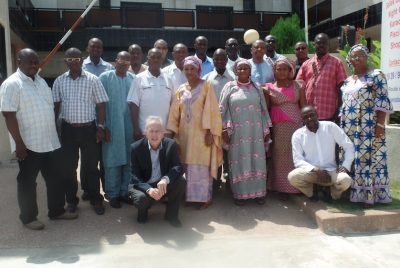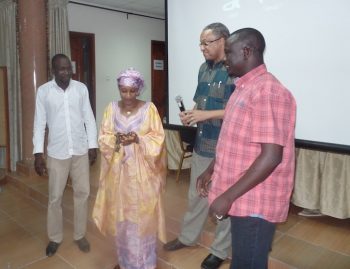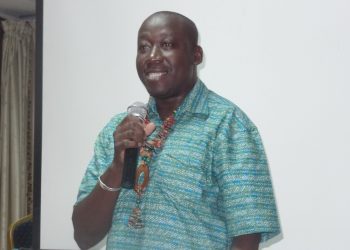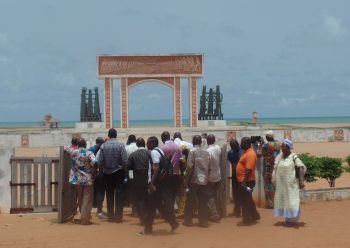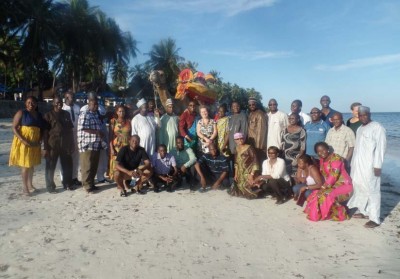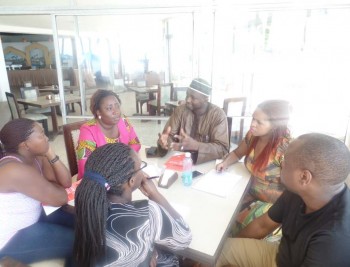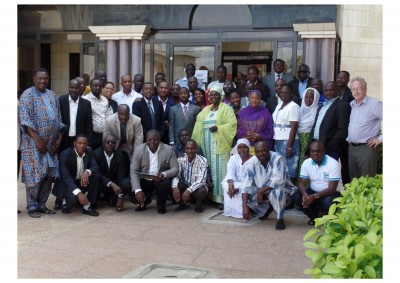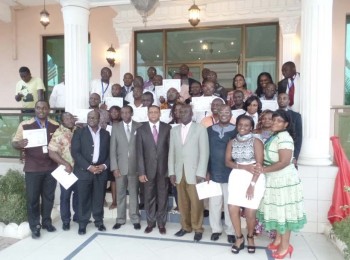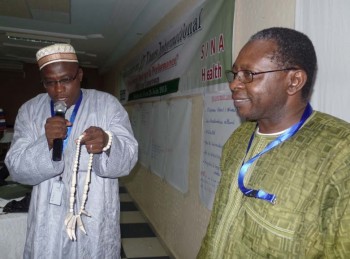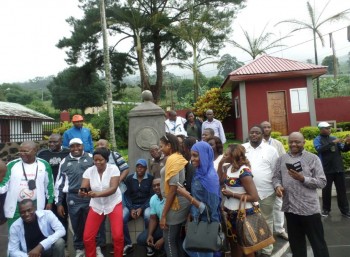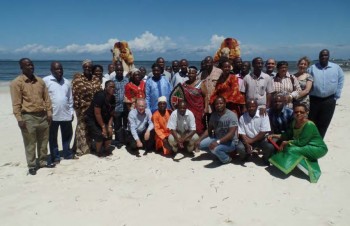
Class 46
The 46th PBF course ended the 1st of May 2015 in Mombasa.
There were 32 participants from Nigeria (11x), Kenya (8x), Zimbabwe (6x), Malawi (5x), Rwanda (1x) and Kyrgyzstan (1x). All participants passed the final exam and there were six distinctions of 90% or more.
The next English Mombasa course will be organised from July 27th to August 7th (contact Godelieve van Heteren at sina_health@hotmail.com or robert_soeters@hotmail.com The next open French spoken PBF will be in Cotonou from October 12nd to 23rd – contact Aoudi Ibouraima at aaoudi1@yahoo.fr
RECOMMENDATIONS OF THE PARTICIPANTS
1. NIGERIA
PBF started in 2011 in Ondo, Nasarawa and Adamawa States in Nigeria with a loan program of the World Bank and administrative support of the National PHC DA and State PHCDA. The program was scaled up to 50% of the Local Government Authorities in the three states. The PBF program considerably improved output and quality of the services and there is great enthusiasm. Yet, there are also a number of challenges, which can be tackled when there is enough technical staff trained in PBF to create a sufficient critical mass of PBF champions.
Nigeria federal level team recommendations
- Develop an Action Plan for the Implementation of PBF in all States in Nigeria;
- Sensitize stakeholders at the State level and create platforms for interaction between PBF implementing states and non-implementing States using the PBF alumni
- NPHCDA should use the national health fund to create a budget line for PBF implementation in all the States
- Conduct advocacy by visiting relevant stakeholders and present PBF at the Federal MOH TMC meeting and the different Technical Working Groups of the National Health Act – 2014 Implementation Committees to obtain their collaboration.
- Conduct PBF presentations and Memo’s to the National Council on Health. Upon adoption of PBF by the National Council on Health, States will be encouraged to roll out business plans on how to roll out PBF.
- Create legal backing for the implementation of PBF in line with existing structures in order to avoid duplication of activities, wastages and conflicts at all levels.
- The team will also work further to ensure the development and operationalization of the National PBF Policy in Nigeria.
Nigeria State level recommendations
- The implementation of PBF in the three states should be according to the PBF best practices;
- PBF should be scaled up to the remaining 50% LGAs in the 3 states and the DFF approach should be abolished, which was only meant as an impact study technique;
- The key actors implementing PBF should be remunerated (regulators, CDV agency etc)
- More policy makers should be trained as change agents in order to create a critical mass of PBF champions in Nigeria.
2. KENYA

Mombasa sunrise
Kenya is engaged in an administrative devolution process of services towards a system with 47 autonomous Counties. This devolution process is still young and also directly affects the health services. Lessons learned and mistakes committed are gradually becoming available.
There are the following issues and challenges:
- The Public Finance Management Act of 2012 states that all funds should pass through the County treasury. Yet, this limits the autonomy of PBF health facilities.
- There still seems to lack the political will and leadership to directly invest in health services. Decision makers require more knowledge about PBF.
- Skilled health personnel are insufficient in particular in peripheral health facilities. Kenya may not have a total shortage of skilled health workers but moreover a distribution problem of lacking incentives to work in remote counties and health facilities. PBF may solve this problem;
- Insecurity is rife in some Counties. Emergency PBF approaches may be proposed to assist the distressed populations
- Poor infrastructure in terms of building, roads, equipment etc. Standard PBF approaches with investment units may assist health facilities to improve their infrastructure and buy equipment
- Poor participatory planning and budgeting
- If the facility management team can plan for user fees and is given the authority to use the revenues, this will lead to improved quality services and improved motivation;
- PBF may be applied in public, private and FBO facilities, thus creating a more competitive environment and choice for patients;
- PBF provide incentives to health workers that perform better in the health sector and thus contribute to better health outputs;
The feasibility based on 19 PBF criteria showed a score of 50%. The main recommendations are the following:
Kenya recommendations
- Increase the subsidies given directly to the health facilities, which is currently far below the 70% of the national budget that PBF proposes to pay in cash performance payments directly to health facilities and community programs.
- Increase the number of RBF indicators at basic health package level from the current ten towards at least twenty.
- Facility managers should be allowed to buy their inputs from accredited distributers instead of receiving drugs from the central medical stores (KEMSA).
- Create in each County a separate CDV agency for the contracting process, verification and coaching. Currently a joint verification committee, connected to the county medical teams, does the verification. There is not really a separation of functions.
The Kenyan team proposed the following advocacy strategies:
- Sensitizing the county health management teams on the PBF concepts
- Sensitizing the county executive committee members for health & the chief officer for health on the PBF concepts and PBF’s benefits
- Sensitizing and advocating for PBF with the county assembly committee for health
- Pilot PBF in at least two health centres and three dispensaries in each County
3. MALAWI
In the recent past, the Malawi public services had as one of its main paradigms to provide free health services and primary education. Many people, however, now realize that what is wanted is not just providing ‘services’ but ‘quality services’.
Malawi has been implementing decentralisation reforms since the early 1990s and government is currently devolving various functions to 35 local government authorities. Providing quality services cannot merely be resolved by increasing government expenditures. It must be matched with at the same time improving the design, implementation and monitoring of the system. Moreover, there is a need to change people’s mind-set and make citizens aware that they also take the responsibility of their own destiny and reflect what they ought to do for themselves and their country. Performance based financing is an approach that supports social entrepreneurship instead of only being ideologically driven by unrealistic advocates of social justice. PBF aims at wide reforms and is, in fact, a new reform approach.
Malawi recommendations
- Reorienting public service delivery from merely increasing access to also improving quality;
- Providing performance incentives to public servants and thereby to improve service delivery;
- Enhancing the collaboration among staff from various sectors
- Enhancing the drive towards decentralization through advocacy for autonomy for public service providers at the local levels;
- Motivating facilities (school, health, etc) to produce more and better quality services and thus receive performance bonuses. This extra income should also be used to improve working conditions and staff salaries
- Separating functions to enhance good governance. It is a ‘purchaser – provider split’ e. a split between purchaser (at district level), regulator (ministry), inspection, provider (schools or hospitals), beneficiaries (communities).
- Target remote facilities providing services with extra payments for the same activity.
- Train and contract community groups to conduct satisfaction surveys (school or health). The results should be discussed with school managers and teachers, health staff or other service managers, so that they obtain feedback on their performance.
4. ZIMBABWE

Mombasa village
During a couple of years Zimbabwe experienced severe socio-economic decline that weakened the social services. In 2010, the Ministry of Health received funding support from the World Bank to finance the health services through results based financing mechanism in 18 rural districts. The project supported primary health facilities and referral hospitals. Based on the encouraging results, the MOHCC and the partners decided in January 2014 to roll out RBF to the remaining 42 rural districts. The urban areas are not yet included in PBF but hopefully they will also start applying urban PBF similar to experiences such as in Cameroon.
The Zimbabwe delegation in Mombasa conducted a PBF feasibility scan which produced a 66% score indicating that there are still steps to be made towards a more pure system.
Zimbabwe recommendations
- Expand scope of programs incorporated in PBF: TB, HIV, Malaria, NCDs
- Expanding scope may increase indicators, and funds available for PBF per capita per year
- Adapt a standard protocol, train personnel, and pay VHWs according to performance
- Cost recovery mechanisms to be adopted for sustainability
- Involve private facilities in the PBF contracts that may help government to improve quality care, reduce costs and improve HMIS reporting of all activities instead of only for government facilities.
- Formalize some cost recovery measures whilst giving the local facility and health centre committee the task of identifying vulnerable clients for exemptions.
5. KYRKIS REPUBLIC
 Health reforms in Kyrgyzstan has achieved almost universal access to health care and increased efficiency by reducing excess hospital capacity and reallocating funds to primary health care facilities. However, the quality of care remains a problem. The WB RBF project focuses on district-level hospitals with the aim of increasing provider autonomy and accountability and improving structural aspects and clinical processes of care.
Health reforms in Kyrgyzstan has achieved almost universal access to health care and increased efficiency by reducing excess hospital capacity and reallocating funds to primary health care facilities. However, the quality of care remains a problem. The WB RBF project focuses on district-level hospitals with the aim of increasing provider autonomy and accountability and improving structural aspects and clinical processes of care.
There are the following challenges that may need t be addressed:
- The project does not pay for output indicators, but focuses exclusively on quality measured using a balanced scorecard containing about 150 indicators.

